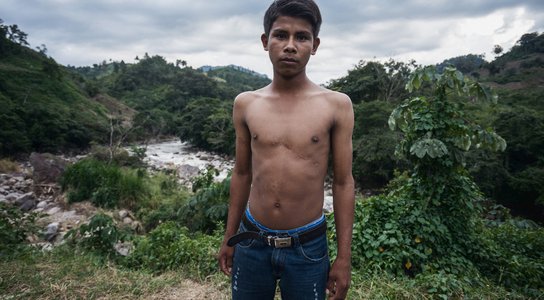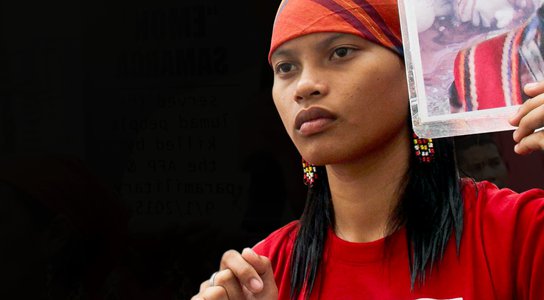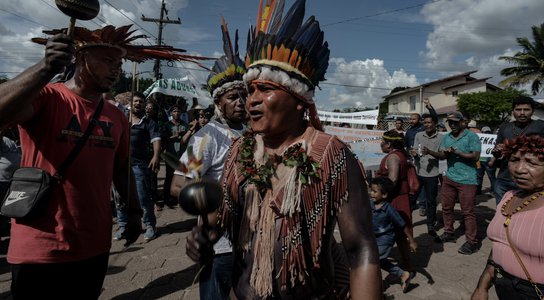In the year since Berta Cáceres was gunned down in her home, at least seven more land and environmental defenders have been killed in Honduras as the government ramps up its crackdown on activism, says Global Witness.
A law passed last month means that protesters can now be tried as terrorists, with state forces granted extra immunity for attacks on civilians. Meanwhile Honduran social media is awash with attempts to slander organisations like Global Witness who support the population’s right to speak out against the theft and destruction of their land.
“As we mark the one-year anniversary of Berta Cáceres’ murder, the situation is dire for those she worked alongside. People defending their land from predatory companies are still being killed, those responsible aren’t being punished and those who speak out are threatened with arrest. Now the authorities are even branding protesters as terrorists. These are all clear signs of a systematic assault on government critics,” said Global Witness campaigner Ben Leather.
Berta Cáceres was one of over 120 Hondurans who have been killed since 2010 for standing up to companies that grab land and trash the environment, according to Global Witness’ recent report. This makes Honduras the deadliest country in the world to be an environmental defender, at the sharp end of a continuing global upturn in attacks, intimidation and criminalisation.
While the triggermen tend to be state forces, security guards or hired assassins, Global Witness investigations into who are behind these killings in Honduras revealed how top politicians and business elites are linked to the dams, mines and plantations at the heart of the violence. Those who order these murders are rarely, if ever, brought to justice.
Tomas Gomez, who took over from Berta Cáceres when she died as leader of rights group COPINH, spoke to Global Witness about the intimidation his community faces from contract killers. “The hitmen tell people, ‘I’m going to kill this and that person.’ They have lists telling them to kill 20 people, and there’s a price on our heads. For me, it’s $200 dollars,” Tomas said.
Global Witness isn’t immune to intimidation either. Upon the launch of its report on 31st January, the organisation’s findings were met with denial, misinformation and threats by industry spokespeople and powerful Honduran politicians, among them Environment Minister José Antonio Galdames, who threatened a Global Witness campaigner with immediate arrest on live television.
Berta Cáceres’ assassination was one of the rare ones to be investigated. Eight people have since been arrested in connection, most of whom have ties to the Honduran military or Desarrollos Energéticos SA (DESA), the company building the dam that Cáceres opposed. Global Witness does not believe that any of these suspects would have ordered the killing. (1)
Meanwhile, it was announced last week that DESA has filed a civil case against a local activist and is demanding nearly $43,000 in damages for publishing “inexact and damaging information” about them.
“It is the job of government to protect its citizens,” said Ben Leather. “The Honduran state must urgently bolster protection for activists at risk, and punish those who order attacks against them. Failing to do so will only encourage future violence.”
/ENDS
For interviews in English and Spanish please contact:
Ben Leather +44 (0) 7841 337 034 [email protected]
Alice Harrison +44 (0)7841 338792 [email protected]
Notes to editors:
(1) When asked to comment by Global Witness on these allegations, DESA denied any involvement in the murder of Berta Cáceres or any links between the company and the army or powerful business actors. This is despite confirming in a letter to Global Witness that DESA’s secretary, Roberto Pacheco Reyes, is the former minister for governance and justice and DESA’s President, Roberto David Castillo Mejía, was a member of the Honduran military. Castillo also denied trying to bribe Berta Cáceres.
/ ENDS
Contacts
You might also like
-
Report Honduras: the deadliest country in the world for environmental activism
More than 120 people have been killed in Honduras since 2010 for standing up to companies that grab land and trash the environment
-
Report On Dangerous Ground
2015 was the worst year on record for killings of land and environmental defenders – people struggling to protect their land, forests and rivers
-
Campaign Land and environmental defenders
Land and environmental defenders play a crucial role in protecting their land - and our climate - against destructive business practices.